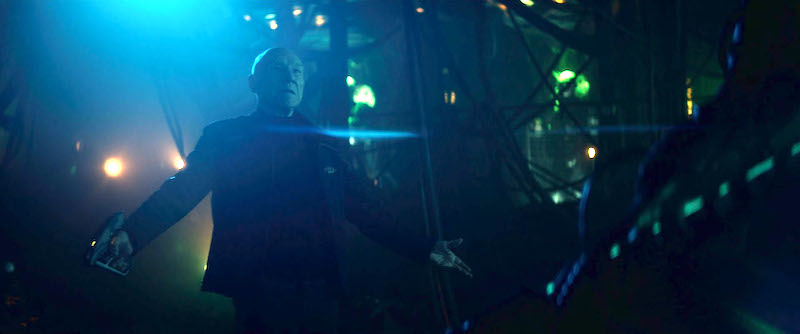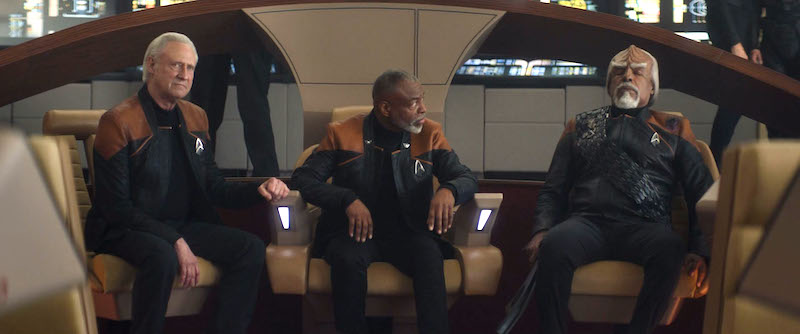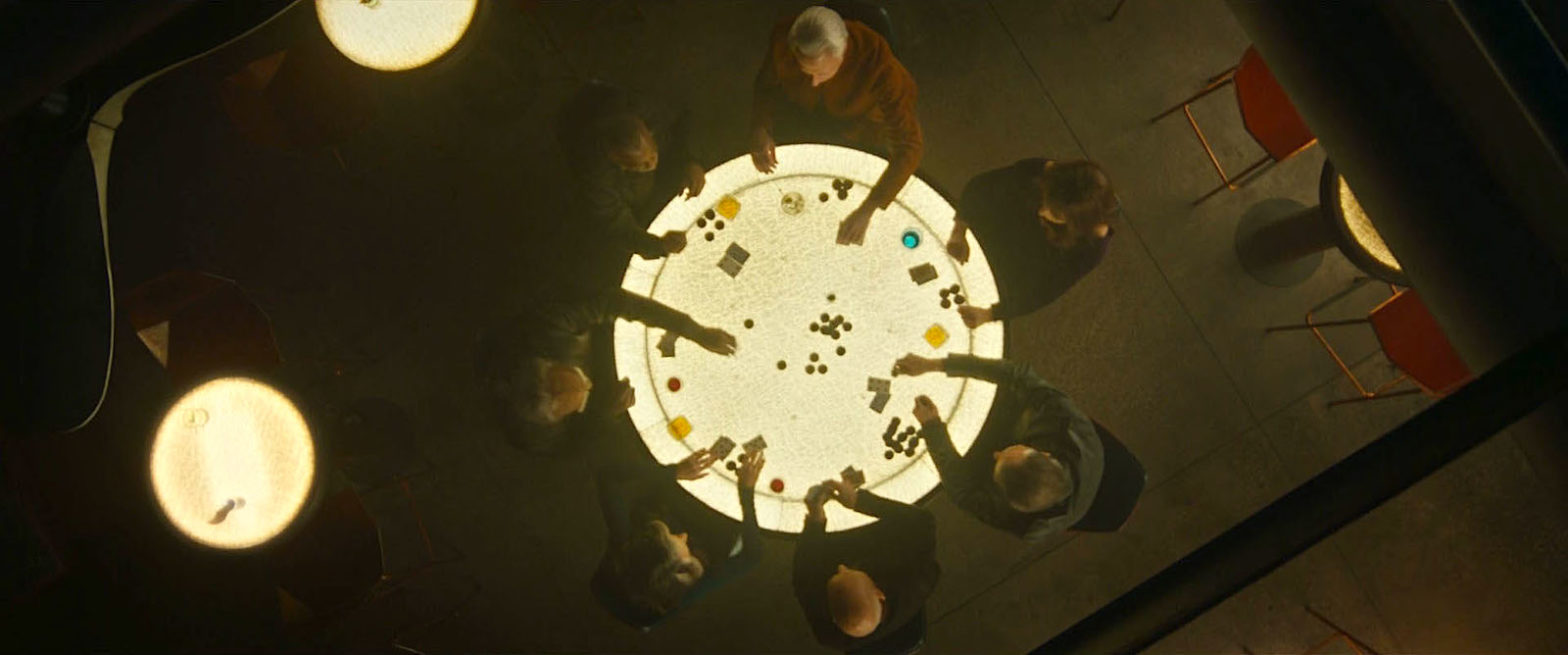This entry was written during the 2023 SAG-AFTRA strike. Without the labor of the actors currently on strike, this television series wouldn’t exist. To learn more, visit the SAG-AFTRA strike site.
“Different, certainly; but certainly not better.”
Almost thirty years ago, CityTV in Toronto books out the SkyDome (back when it was called that), and shows the final episode of Star Trek: The Next Generation on the Jumbotron, having given away all of the tickets to the event for free. This, in itself, is monumental: it demonstrates that somehow, over its seven-year lifespan, The Next Generation has gone from unwelcome upstart to a wholesale rejuvenation of the Star Trek brand. Deep Space Nine launches during Next Gen‘s sixth season with a handoff from Captain Picard; Star Trek VI: The Undiscovered Country goes to theatres two years prior to that, with a handoff from Leonard Nimoy (on the television side) and Michael Dorn (in the movie). The Next Gen team is now picking up the baton and moving to feature films (after, it must be said, a victory lap couple of seasons that were showing signs of an entire creative team growing too comfortable in their seats). A fourth Star Trek series is being commissioned, to launch a fifth American television network (back when there were only four).
I am sitting in one of those seats at the SkyDome on May 23, 1994. I am watching what will become my favourite episode of a television series that has already posted three or four of my favourite episodes of television of all time; I am watching what will become a defining example of how to accomplish a series finale, one whose influence has reached as far as the second-highest grossing film of all time. Some part of me, sitting in that seat, is already old enough to know that something is ending — and that all of those promised future adventures for the crew of the Starship Enterprise and her many sister crews may be good, may be great, may be something else entirely, but they will certainly be at least one thing I can count on: not the same.
It is a matter of historical irony that Ron Moore and Branon Braga spend the entirety of The Next Generation‘s final year of production working torturously on the screenplay for the crew’s first feature film, Generations, only to return to the writers’ room one last time and knock out the script for “All Good Things…” in a couple of weeks. “All Good Things…,” of course, is the masterpiece; and Generations (a film which I like more than most people do), is… not. In “All Good Things…” time flows backwards from an anti-time eruption in a future thirty years after season seven, in which Picard’s Iromodic Syndrome is killing him, Beverly commands a starship, and Deanna is dead. The anti-time anomaly contracts through reverse chronology to threaten the universe on the day of the first adventure of the U.S.S. Enterprise, a day in which Tasha is still alive, O’Brien is at the helm, and Picard races to his first rendezvous with Q, only to find the tormenting god in absentia. Picard — our Picard, season seven Picard — flits backwards and forwards across the span of his life with the crew of the U.S.S. Enterprise, like Doctor Sam Beckett, seven years before Doctor Beckett himself would become the captain of the Enterprise, in a spinoff of an adventure that Picard would have on the big screen in the intervening years, which takes place three hundred years before “All Good Things.”
I don’t like First Contact. I don’t like Enterprise. I like Generations just fine, like I said, but mostly because it is the only one of the four films with this crew that feels and looks and sounds exactly like Next Gen — the cast and crew take scarcely two weeks off between filming the last episode and the first movie in 1994 — which is as much a failure as it is a comfort. In Generations, Picard is thrust into the temporal Nexus and must briefly consider what a life of perfect bliss looks like for him. It looks like a Victorian home decorated for Christmas; a doting wife; a loving family. There was a secret inside Jean-Luc all this time, it seems, one which contradicts the entirety of the text. As recently as “Bloodlines,” the fourth-last episode of Star Trek: The Next Generation, he had no fucking idea how to be, nor any stated desire to be, a father.
The Next Gen feature films are unsatisfying. It’s slim margins, but to many, the last of them — Star Trek: Nemesis, released in 2002 — is the most unsatisfying of all. Data dies in that film; Riker and Troi get married and leave the Enterprise. It’s an ending film; it’s about the crew moving on. It’s just not as good as the previous crew’s ending film, The Undiscovered Country, and unlike that film, it is released in an era where low-rent Star Trek budgets simply cannot compete in the “event film” space in the same way that Star Trek VI barely got away with in 1991. Nemesis gets feshmullioned at the box office by The Lord of the Rings: The Two Towers, and watching the films within a few days of one another — as I do, in December of 2002 — is to be confronted by an undeniable sense of a sea change in Hollywood. The franchise era ends, and the IP era begins. Aren’t franchises “IP,” you ask? Literally, yes. Functionally, though, the distinction is so enormous that the industry must come up with a new term.
In the years after Nemesis dies in ignominy, the crew of The Next Generation does as Star Trek crews do, and attends Star Trek conventions (while those still exist) and Comic Cons (as those take their place), and are interviewed for this project and that, and they begin to retcon the creative intentions of Nemesis. It was never meant to be the last one, they now claim. They wish aloud for an opportunity to give the Next Generation crew “a proper sendoff,” like the original crew had. If someone had only told them that this was the end, they’d have done something different, something better, something worthy. I call poppycock on this; but nevertheless, the crew is in luck. In the franchise era, Star Trek VI could be the last of something. In the IP era, there is no last one.
In the series premiere of Star Trek: Deep Space Nine, Quark tells Commander Sisko, “I’ve made a career out of knowing when to leave.” That career is harder to find in Hollywood, and nearly impossible in fandom. Fans never like endings — there is a reason the final episode of Star Trek: The Next Generation is titled as it is — but the smarter amongst us recognize that stories only gain their full value by having final acts, final lines, final images. Hollywood, which is now operated as a small-to-mid-size subdivision of seven of the largest capitalist conglomerates on the planet, couldn’t care less. If fans want to buy more story, Hollywood will sell it to them. If that means turning all of the past fifty years of pop cultural storytelling into little better than soap opera-style narrative infinity pools, then so be it.
I have remarked repeatedly throughout Blogging The Next Generation: Picard that this series is obsessed with Star Trek: Nemesis. The final Next Gen feature film (for now — on which, more in a moment!) was an hour and 56 minutes long. More episodes of Star Trek: Picard address plot points and details from Nemesis than they do any other thing, with the possible exception of the Battle of Wolf 359 (Jean-Luc Picard’s ur-text). At thirty hours strong, Picard, the series, is a mega-length annotation of a less-than-two-hour vampire movie from 20 years ago that nobody should spend any amount of their time thinking about. At ten hours, Picard‘s third season is a full narrative broadside to Nemesis, the other three films, and most of the Star Trek series that followed Next Gen. This crew has licked the wound of their 2002 finale for so long that it has festered, cracked, and become their entire personality. The dirtly little secret, though, is that there is far less distance between Nemesis and Star Trek: Picard than anyone involved, and many fans watching, would likely admit. They come from the same place. They’re chasing the same idea: a second sendoff for the Next Generation crew, one which somehow measures up to “All Good Things.” Let me borrow a word from the Borg: it’s futile.

In “The Last Generation,” what remains of the Borg Queen slithers down from the ceiling and taunts Jean-Luc Picard for the “last” time, the ruin of her body grafted onto insectoid inards and spidery legs, living on the life-energy of her own drones. She’s an uncanny metaphor for IP, and here she faces down Jean-Luc, who literally does the arms-out, “come and get me” pose as he strides into the wrestling ring with a gun in his hand. The time pilgrim of “All Good Things…,” this is not. Sir Patrick is now 80 years old — the age Picard was meant to be in the future sequences in the former series finale — and has been a producer on this project from its inception, and is part of the chorus of people who promoted Star Trek: Picard‘s third season by invoking “Star Trek: The Next Generation Season Eight.” The movies are not de-canonized — Halloween this is not — but they are wiped away like bad dreams. The messaging on Picard season three is simple: this is the real finale for that thing we loved way back when.
There’s a lot of fanboy wet dream shit in “The Last Generation.” Walter Koenig providing a voice cameo as Chekov’s son (named Anton, after Yelchin). The La Forge girls (and Ensign Esmar) moving in unison as the Borg hive mind controls them. Riker trying (and failing) to heft Worf’s mek’leth. Data flying the Enterprise through the Borg Cube as though the kilometre-long starship is the Millennium Falcon and he’s Lando. Picard re-assimilating himself into the Borg, to pull his son out of the Collective. Deanna using “empath sonar” one more time, this time to save, rather than destroy. And the good guys win and everybody lives — an atrocious effort to convince us that Will is going to die is more distracting than effective — before the Titan is re-christened the U.S.S. Enterprise-G and sent off to the stars with Seven of Nine in command. Fanboy wet dream shit, as sugar-high and tonally awkward as any number of fan fics across the whole history of the internet.

And as for our heroes? These beloved old faces? Everyone’s giving as good as they’ve got, for the most part. Stewart’s still telegraphing his punches, performance-wise; it’s been shocking how overstated his entire characterization has been throughout this series. (Logan was six years ago, and Stewart was superb, supple and clever.) But his heart is clearly in it as he farewells his crew and embraces his son, and who can resent an old man his heart?
Spiner’s reanimated Data is a bit broad for my taste, too, and the out-of-control emotional comedy played better in Generations. (An epilogue counseling session for him with Deanna is bafflingly trivial.) But Frakes, McFadden, Sirtis, Burton, and Dorn land moment after moment after moment in this episode, and have been giving us what we’ve wanted all season. (The stay-behind-on-the-ship contingent, with Geordi in command, gets the lion’s share of the episode’s great moments — both for fun, and for poignance.) They understand the assignment, and are relishing in having been handed this shot, 21 years after the fact. This, for my money, is fair: Stewart and Spiner were given arcs and plots across all four Next Gen feature films, even when the storylines didn’t require it of them. It was the other five who were forced to sink into the seat cushions. If Picard‘s third season gave us all of them back (plus Ro!) for one last trot around the boards, well, they’ve earned it a dozen times over.
Terry Matalas, again directing, turns the lights off on the Enterprise-D, now lovingly enshrined in Geordi’s space museum. The old gang closes down Guinan’s bar — that fucking bar — one more time, and just when you think Picard has monologued his last, he whips out a deck of cards like a table magician at a gastropub, and the crew sits down for one more round of poker. This time, as the camera floats away into the sky as it did at the end of “All Good Things…,” the image does not fade away. It hovers. It rotates. Do all good things need to end?, it seems to ask. Do they?
Which, of course, brings us to one last creative project, for Picard‘s third season, particularly. No, we did not see my hope fulfilled that “The Last Generation” would somehow, incredibly and improbably, assemble the entirety of The Next Generation‘s next generation, pulling Kestra, Soji, and poor, unbeloved Alexander into the save-the-universe stakes alongside Jack, Sidney, and Allandra. Whether any future writers and directors remember that those characters exist is beside the point; the creative ambition of creating Jack and the La Forges in the first place plays out in post-season interviews with Matalas and key cast members. Couldn’t the story continue from here, given the rechristening of the Enterprise, the captaincy of Seven of Nine, the warm embrace of season three’s fan-potion mixture of legacy characters with the next generation of The Next Generation? Four months after “The Last Generation” airs, Patrick Stewart is on tour promoting his memoirs (Picard never finished his, but Stewart did!) — and, he posits, with Star Trek: Picard such a smashing success, couldn’t there be one more Next Gen feature film, a proper sendoff for the Next Generation crew, since they never got one, and evidently this season no longer counts as one either?
Do all good things need to end?
The card game continues, and the camera spins, and finally dives into the illuminated table, which becomes a sun, around which the Enterprise is orbiting. Nemesis failed as IP, but Star Trek: Picard has learned the lessons of the MCU well. It’s time for a stinger, and for Q to turn up to underline the point, which might be the point of the whole series: nobody really dies. Nothing really ends.
Blogging the Next Generation: Picard ran Thursdays on tederick.com as I worked my way through every episode of Star Trek: Picard. The original BTNG did the same for Star Trek: The Next Generation.
